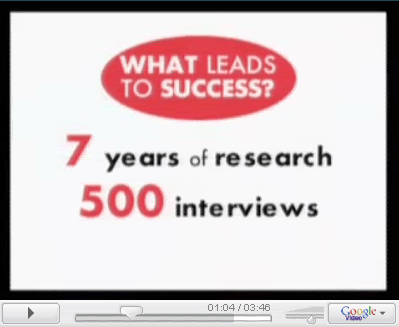Dear Friends,
Last weeks Quick Tip: The power of evidence... "SOLD" I talked about briefly about the principal of Social Proof, today I would like to go a little more in depth about this subject.
I used to take the bus to work each day. The buss stop was a two minute walk from my house, so I knew just what time I had to leave to catch it. Every week or so, I would be strolling towards the bus stop with my fellow commuters, when we would catch sight of someone sprinting along the street at the end of the block. Within moments, one of us would start doing that peculiar ‘too-fast-walking’ thing. Then someone else would start jogging. Then one would break into an outright sprint. Pretty soon, everyone was making a madcap dash for the bus stop. See, from where the person was running at the end the block, it was possible to see the buses arriving. All it took was for one or two people to think “If you don’t get a move on, you’re going to miss the bus”, and start running. Within moments, everyone else would start running too. Almost without exception, it turned out that the original runner was running for some other reason, and everyone turned up at the bus stop hot, sweaty & out of breath. We were moved by the phenomenon of ‘Social Proof’.
Everyone Else Is Doing It
Social proof is a simple rule of thumb that’s coded into human neurology. It is the basic idea that “if other people are doing it, there is probably some merit in it.” We look to the behaviour of others to help us decide what we should do. This rule of thumb is one of the most powerful tools available to us as influencers, and there a number of examples of how it can be put into practice:
· Stories about how other people responded in a certain situation
· Customer lists
· Testimonials from happy clients
· Having satisfied customers talk to clients-to-be
Of course, advertisers & other compliance professionals sometimes hijack this phenomenon to their own purposes, for instance:
· Interviews with actors pretending to be ‘the average person in the street’ on TV ads.
· Nightclub owners who keep people queuing outside a half-empty club to make people think its more popular than it is.
· Bartenders who pad their tip jars with a 10 or 20 dollar bill
This is a bit cheeky, more and more, people are able to see through such tricks, but the power of a real customer testimonial, or a true story about another client who had a certain challenge can still be powerful.
1) Identify someone you wish to influence. Then think of a way that you can bring social proof to bear on the situation. Who can you identify that has been influenced in the way you want them to be influenced, and who is a credible subject.
Credibility Counts
Note that I said “and who is a credible subject.” I have clients ranging from private individuals right through to large national companies. If I am telling the owner of a small business “I can help your team to reach new levels of performance”, and I give her examples of how I worked with a large company to get the same kind of results, she may be impressed, but she’s unlikely to identify the larger company as being enough like her for social proof to take effect. If on the other hand I give her an example of a business similar to hers that I’ve had great success with, social proof will be more likely to kick in. One of the keys to social proof is the following: people will tend to be influenced by the actions of other people like them.
Benefits crank up the volume
Remember if the perceived benefits of what you offer outweigh the perceived costs/risks of it, then you’ve got a good chance of persuading someone. If you want to amplify the power of social proof, it’s not enough to just to go for credibility – you need to let your ‘influencee’ know just how they’re going to benefit. My ideal client testimonial doesn’t just say “Try Jeff’s training – it’s great.” My ideal testimonial says “I went on Jeff’s training and I now get benefits x, y & z” where the benefits are things that my influencee is going to value. For instance, while its fun to learn cool influence techniques, those techniques are rarely the benefit in & of themselves; the benefits are things like:
· More money
· More spare time
· Happier clients
· More fun in my life
· A sense of freedom
· Etc etc etc
If you can get someone like you to tell you about how they used my services and got benefits that you highly value, there’s a good chance you’re going to pay attention. To me, that seems like a good position to be in.
2) Identify the kind of benefits that your influence target is likely to value, then identify someone like them who has got those benefits from what you are suggesting.
Then, it’s just a matter of getting one person to tell the other about it (whether face to face, in a letter, on a website or whatever.)
Speaking of which, what specific benefits have you got from reading these 3 Minute Tips and putting them into practice? I would love an email from you telling me what you did & how you benefited. If it’s OK with you, tell me what you do for a living, and I may quote you to help give other people a genuine piece of social proof for signing up to my tips!
Are you interest in learning more about how to use Social Proof? That's just one of the topics covered in my new workshop SkyRocket Your Sales: The 5-Step Sales Process.
One of the fastest ways to build a successful business is by training. Now, with me, I like to invest significant time immersing myself in training, while some people prefer to take it in bite-size chunks. Whatever your preference is, now is the best time to contact me and schedule SkyRocket Your Sales: The 5-Step Sales Process for your company.
Thanks for spending 3 minutes with me...
The best is yet to be!
On Your Team
Jeffrey Stanton
Your Trusted Advisor For Life
If you have found this tip useful, please share it with any friends, family, colleagues and associates who you think will be interested. Feel free to print it (with credit and subscription information) and continue to enjoy the tips. I am always grateful for any comments, criticisms or other feedback that you may have. Please send them to feedback@jeffreysjournal.com


































No comments:
Post a Comment